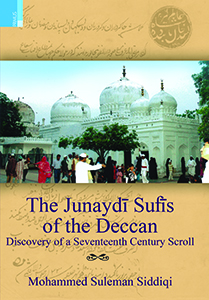
Junaydi Sufis of the Deccan: Discovery of a Seventeenth Century Scroll
AUTHOR – Muhammad Suleman Siddiqi
| HB ₹1195 . $79.95 . ₤52.95 |
||
INFORMATION
- AUTHOR : Muhammad Suleman Siddiqi
- HB ISBN : 978-93-80607-52-8
- Year : 2014
- Extent : xxxii + 294 pp.
- Discount available on checkout
- Usually dispatched within 3 to 5 working days.
Junaydi Sufis of the Deccan
| HB ₹ 1195 . $ . ₤ |
PB ₹ . $ . ₤ |
|
| POD ₹ . $ . ₤ |
e-Book ₹ . $ . ₤ |
INFORMATION
- AUTHOR – Muhammad Suleman Siddiqi
- ISBN – 978-93-80607-52-8
- Year – 2014
- Extent: 400 + 40 coloured illustrations
- 10% discount + free shipping
- Usually dispatched within 3 to 5 working days.
The Junaydi Sufis of the Deccan, based on two rare scrolls discovered in the Deccan, recasts the history of Sufism in north India in general and in the Deccan in particular. It records the presence and active involvement of the Junaydi Sufis in the establishment of the second capital at Daulatabad by Mohammad bin Tughluq during the Sultanate period (1206-1526) and the Deccan during the Bahmani period (1347-1538), contrary to established assumptions that it was the Chishtis alone who spread Sufism in this region. This book traces the spiritual and family genealogy of Muhammad ‘Ayn al-Din alias Ganj al-‘Ilm back to Abul Qasim al-Junayd of Baghdad. It contains extracts from an extinct fourteenth century text, Atwar al-abrar by Muhammad ‘Ayn al-Din Ganj al-‘Ilm revealing rich details of a large number of prominent Junaydi Sufis, including women, from the family of Muhammad ‘Ayn al-Din who were active in the Deccan during the fourteenth and fifteenth centuries.
Besides reproducing the facsimiles of the two scrolls and the translation of the spiritual lineage, this book also transcribes the lineage in its entirety. Also included are some rare fourteenth and seventeenth century documents, one of which may well be the oldest Persian document in the history of the Deccan to substantiate the presence of the Junaydis in that region.
The Author
Mohammed Suleman Siddiqi is presently Professor, Maulana Abul Kalam Azad Chair at the Maulana Azad National Urdu University, Hyderabad and former Vice Chancellor of Osmania University, Hyderabad (2005-8). Professor Siddiqi has also been the Head and Chairman, Department of Islamic Studies, Osmania University.
‘This volume provides a meticulously edited and translated cache of Persian documents, opening a window onto a fascinating chapter of Indo-Muslim history that would otherwise remain hidden…’— CARL W. ERNST, University of North Carolina, Chapel Hill
The Junaydi Sufis of the Deccan, based on two rare scrolls discovered in the Deccan, recasts the history of Sufism in north India in general and in the Deccan in particular. It records the presence and active involvement of the Junaydi Sufis in the establishment of the second capital at Daulatabad by Mohammad bin Tughluq during the Sultanate period (1206-1526) and the Deccan during the Bahmani period (1347-1538), contrary to established assumptions that it was the Chishtis alone who spread Sufism in this region. This book traces the spiritual and family genealogy of Muhammad ‘Ayn al-Din alias Ganj al-‘Ilm back to Abul Qasim al-Junayd of Baghdad. It contains extracts from an extinct fourteenth century text, Atwar al-abrar by Muhammad ‘Ayn al-Din Ganj al-‘Ilm revealing rich details of a large number of prominent Junaydi Sufis, including women, from the family of Muhammad ‘Ayn al-Din who were active in the Deccan during the fourteenth and fifteenth centuries.
Besides reproducing the facsimiles of the two scrolls and the translation of the spiritual lineage, this book also transcribes the lineage in its entirety. Also included are some rare fourteenth and seventeenth century documents, one of which may well be the oldest Persian document in the history of the Deccan to substantiate the presence of the Junaydis in that region.
The Author
Mohammed Suleman Siddiqi is presently Professor, Maulana Abul Kalam Azad Chair at the Maulana Azad National Urdu University, Hyderabad and former Vice Chancellor of Osmania University, Hyderabad (2005-8). Professor Siddiqi has also been the Head and Chairman, Department of Islamic Studies, Osmania University.
‘This volume provides a meticulously edited and translated cache of Persian documents, opening a window onto a fascinating chapter of Indo-Muslim history that would otherwise remain hidden…’— CARL W. ERNST, University of North Carolina, Chapel Hill




